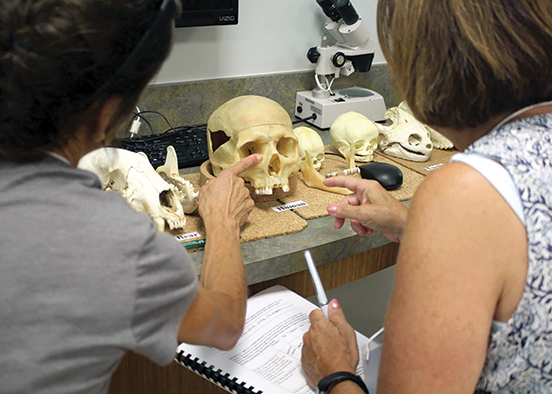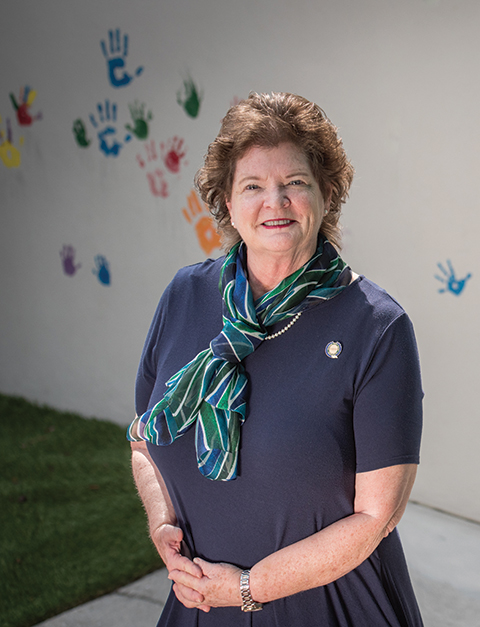For many reasons – lack of finances among them – students in the United States risk losing ground when it comes to taking their places as innovators in the fields of science, technology, engineering and mathematics (STEM).

In Southwest Florida, thanks to the generous support of STEM education by the Schulze Family Foundation, FGCU students and area teachers have the opportunity to reverse the trend. Foundation support focuses on three distinct pathways, each with the goal “to attract, educate, inspire, mentor and prepare the future leaders and workforces for the challenges ahead.”
STEM education is, however, much more than content. It is equally about inspiring educators to take their knowledge and skills into the classroom in a way that engages students, intensifies their interest in the sciences, and encourages them to embrace the challenges in an increasingly complex world. Support is available to undergraduate and graduate students as well as educators focusing on teaching STEM in Southwest Florida schools.
Mary Beth Geier, Florida director and senior program officer for the Richard M. Schulze Family Foundation, underscored this critical importance: “STEM education stimulates critical thinking, increases scientific literacy, and helps shape the next generation of innovators. Proficiency in the sciences is a huge step forward for almost everything we do, sustaining business and the economy as well as helping to build a healthier life and a stronger one.”
When asked why FGCU, Geier said, “Our intent is to invest in best-in-class organizations. We know FGCU, with its strong leadership and its capacity to scale, is best in class. Our support of FGCU’s future teachers is directly related to our understanding of the great need for STEM educators in Southwest Florida and of FGCU’s continued success.”
Dolly Farrell, senior director of development at FGCU, calls the generous support of the Schulze Family Foundation “an extraordinary opportunity not only for FGCU’s current students – and their future students – but also for our community, which benefits from a workforce well versed in the sciences.”
Schulze Future Teacher Scholarship
Pathway One offers the Schulze Future Teacher Scholarships, focusing on existing STEM majors and incentivizing them to add a minor in education. In return, recipients agree to teach one year for each year they receive the grant (for a maximum of two years provided the student remains in good standing). The idea is to take STEM students’ in-depth subject knowledge and train them to teach in the K-12 environment.
Since its inception, 12 FGCU students have received the scholarship, several going on to make teaching their full-time career after their obligations as grant recipients were met. Pathway One relies on recruitment through STEM faculty and advisors and the FGCU Foundation.
Brad Windey (’16, environmental science) learned of the scholarship from his chemistry professor. “I was an environmental science major,” Windey said, “but I had been thinking about teaching. My professor knew that and recommended me; I applied, and the rest is history.”
Today, Windey teaches physical science to eighth-graders and earth science to sixth-graders at Varsity Lakes Middle School. He is pleased with his career choice and said, “I’m very proud to be a recipient of the Schulze scholarship. I can’t thank them enough,” he said of the life-changing support. Without the scholarship and its one-year teaching requirement, he would not have found his passion.
Teacher Immersion Program (TIP)
Pathway Two focuses on career changers, adults who are interested in taking their knowledge into the classroom, sharing not only subject content with students, but also life experiences. The four-semester graduate-level Teacher Immersion Program (TIP) is designed to support these career changers on their journey to earning teacher certification.
In some cases, TIP participants have never been in the classroom; others have secured temporary teaching jobs but need the required certification to carry on in a permanent capacity.
Michelle Matuszak, an adult career changer, teaches science at Golden Gate Middle School in Naples. She is in her last semester of TIP, soon to take her final teacher certification exam, at which time she will move from temporary teacher status to permanent. She credits the support of the Schulze Foundation Scholarship for giving her the financial wherewithal to take this final step toward permanency in the classroom.
While Matuszak’s journey is atypical of many career changers, it does illustrate how well a person’s job experience – regardless of the profession – translates into the classroom.
When she was 19, Matuszak accepted a job in a local funeral home as a receptionist. She comforted grieving families, performed odd jobs and learned about preparing human remains. And she learned two more important things: She loved it and was good at it.
Fast forward – she changed her major to mortuary science; earned her degree, took the national board exam for funeral directing and licensing, and enjoyed a 20-year career working her way up to funeral home director.
“All kinds of skills are needed to be successful in this profession,” she said. “The art and science of preparation and presentation of the deceased is just one part. But you also must be proficient at writing and speaking with families during their difficult time. You need to be respectful, compassionate. You need to know about different religions because each has its own needs and rituals. My education is really well rounded.”
And it is the sum total of Matuszak’s education that she brings to her classroom. That is the gift of a career changer – the infusion of varying life experiences to share with their students.
Until learning about the TIP program at FGCU, Matuszak was unclear as to how she would manage her journey to certification from a financial standpoint. As of this writing, she is one exam away from solidifying her second career and is grateful for the support the Schulze Family Foundation afforded her.
Schulze Summer STEM Institute
Pathway Three, the Schulze Summer STEM Institute for K-12 teachers, is a one-week master in-service summer workshop open to teachers – in any subject area – who are interested in learning how to create innovative ways to introduce STEM in the classroom; enrollment is free.
Laura Frost, now associate dean of the College of Arts & Sciences and formerly director of the Whitaker Center for STEM Education, cofounded the STEM Institute in 2013. Between 2013 and 2019, 275 teachers participated, facilitated by a team of FGCU faculty, each of whom conducts different aspects of the program.

“In 2016, with the infusion of the Schulze funding,” said Frost, “the program expanded greatly, and we couldn’t be more grateful. In 2020, due to COVID, we pivoted to a virtual workshop.”
The STEM Institute takes place onsite at the Conservancy of Southwest Florida, FGCU’s partner in the program, as well as one day each at FGCU and the Vester Field Station in Bonita Springs. Consisting of two week-long workshop sessions each summer, the Institute serves an average of 25 participants per session. Heather Skaza- Acosta, assistant professor of environmental education at FGCU, holds a joint appointment with the Conservancy and, as its education director, helps to coordinate activities.
“The theme,” said Frost, “is not about teaching content. The theme is about giving teachers the tools to learn how to teach STEM and instilling in them the confidence to create engaging lesson plans.”
This, in turn, gives the students the confidence to pursue the sciences as a viable career interest. Robyn Peer graduated from the University of South Florida in 1991. Seven years ago, after 18 years teaching language arts, she moved into the gifted classroom, teaching second- through fifth-graders once a week at Edison Park Elementary and two days at Colonial Elementary in Fort Myers.
With 27 years teaching under her belt, Peer was feeling burned out – the been-there, done-that feeling that creeps up on us from time to time. “I love teaching but I was at a standstill.”
That’s when she and a friend enrolled in the STEM Institute. “Honestly, I had zero interest in science. I didn’t like it. But I do love to learn, grow and find out new things. So I gave it a try.
“Attending the STEM Institute completely changed my life,” she said. “The professors were amazing. They cared. They were interesting. I fell in love with science. I learned I can teach it, and that it’s fun and exciting. The STEM Institute sparked a whole new fire in me.”
Participants completing the STEM Institute are given a $1,000 stipend to buy supplies for their classrooms or, alternatively, fund science-related field trips. Peer purchased a hydroponic garden tower and developed creative lesson plans for her students.
One example: comparing and contrasting seeds grown in the indoor hydroponic tower with seeds grown outdoors in the sunlight. Students kept scientific journals documenting their findings.
“FGCU is on the cutting edge of things happening all over the world,” said Peer. “I was so impressed and proud for our community.”
“The Schulze Foundation understands teachers’ needs, the community’s needs,” said Peer. “I am so grateful that they chose to invest in us. The whole experience was so eye opening for me and totally changed my perspective as to where I was in life and how far I could still go. From the bottom of my heart, I would like to thank the Schulze Foundation for giving me this life-changing experience.”
[/vc_column_text][vc_column_text]TO APPLY
Scholarships are available for the 2021-22 academic year. Go to the Summer STEM Institute website for more details. For information on the teaching program, got to its website. Or call the Whitaker Center at 239-590-7444.

HELPING CHILDREN SHARPEN SKILLS
It’s called “summer slide” – those neither here nor there weeks between pre-school and kindergarten when children tend to lose academic and social skills.
“The Schulze Family Foundation is a huge supporter of early education and literacy,” said Professor Elizabeth Elliott, chair of the Department of Teacher Education and interim director of the Little Eagles Learning Center. “And with their generous support, FGCU offers its Voluntary Pre- Kindergarten (VPK) program, serving approximately 100 Lee County children each summer.”
The VPK is conducted at Little Eagles Learning Center on campus as well as four additional partner centers in Lee County. Funding covers teacher salaries, children’s tuition, supplies, two family events and a yearly one-day conference focusing on transition from pre-kindergarten to kindergarten.
Then there is the year-round Early Literacy Learning Model (ELLM). Thanks again to the Schulze Foundation, area children have a leg up on learning. The program is operated by Childcare of Southwest Florida. The grant for ELLM funds a part-time literacy coach and all program materials for 10 Lee County classrooms.
As principal investigator for both initiatives, Elliott wrote the grants and is responsible for distributing the funds. “The impact of both programs is impressive,” said Elliott. “Post-program assessments judge participants ready academically and socially to enter kindergarten with the skills they need to be successful.”[/vc_column_text]